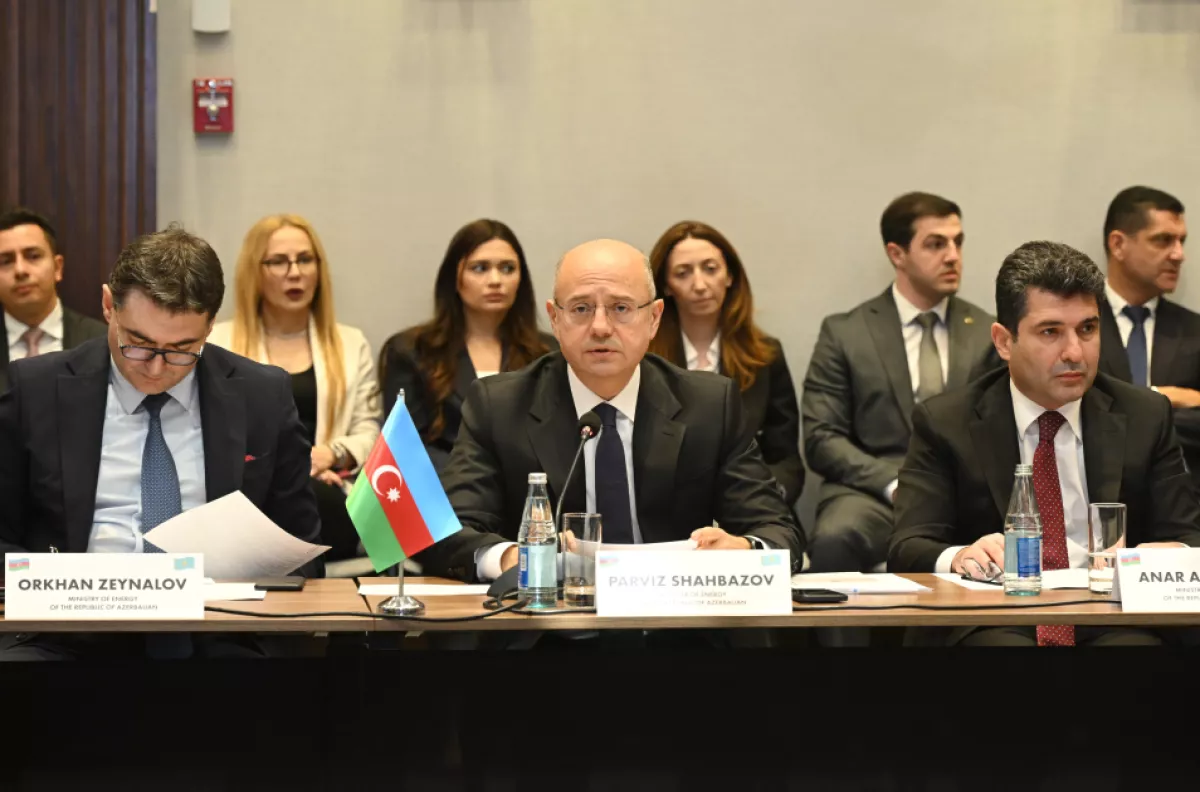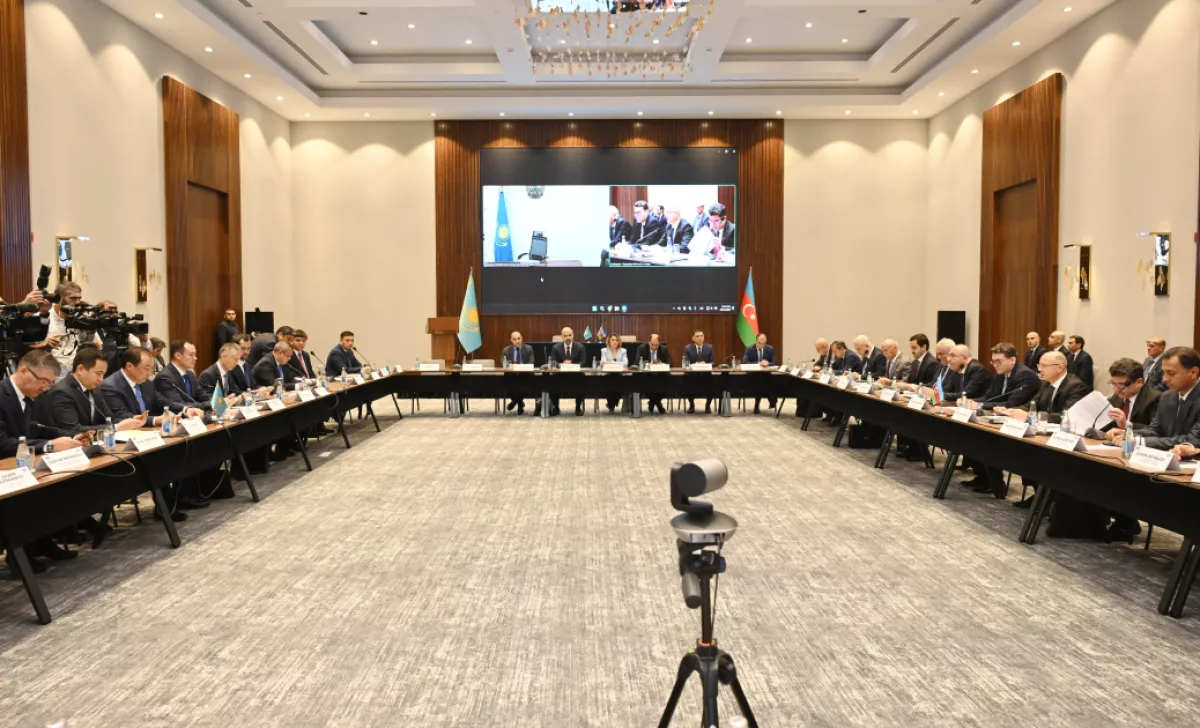Azerbaijan and Kazakhstan on the path of integration From oil pipelines to AI bridges
For many years, Azerbaijan and Kazakhstan have enjoyed strong cooperation in the energy and transport sectors. Today, this partnership is expanding steadily, with increased oil transportation via the Trans-Caspian route and collaboration on the implementation of the Zangezur Corridor. Over the past three years, the two countries have focused on boosting trade, diversifying business ties, increasing mutual investments, and developing joint projects in non-oil sectors. These priority trends have been consistently discussed at various forums, as well as in government- and head-of-state-level negotiations. The recently held 21st meeting of the Joint Intergovernmental Commission (JIC) on Trade and Economic Cooperation in Baku was no exception.
The fraternal and allied countries, united by a shared history, culture, and strategic vision for the future, have actively developed business ties throughout their years of independence, particularly in the transport and energy sectors. Azerbaijan–Kazakhstan relations, however, reached a qualitatively new level in August 2022, following the signing of the “Declaration on Deepening Allied Interaction and Strategic Partnership” and the adoption of the Comprehensive Cooperation Development Programme for 2022–2026. Since then, for over three years, trade and economic cooperation between the two countries has gained significant momentum, with projects across various non-oil sectors beginning to take shape.
“Regular meetings of the Joint Intergovernmental Commission play a key role in coordinating the activities of the relevant state bodies of our countries and give additional momentum to cooperation in areas of mutual interest. I am confident that today’s meeting will mark another important step in expanding our mutually beneficial partnership,” said Parviz Shahbazov, Minister of Energy of the Republic of Azerbaijan, speaking at the 21st session of the commission. “I would especially like to emphasise the importance of the Declaration on Strengthening Strategic Relations, as well as the Comprehensive Cooperation Development Programme for 2022–2026, signed by the heads of our states.”

According to the Minister of Energy, these documents serve as a guide for deepening practical cooperation in areas such as trade, investment, energy, transport, information and communication technologies, agriculture, and humanitarian collaboration. Minister Parviz Shahbazov also noted that the high effectiveness of initiatives implemented between the two countries is reflected in the strong trade dynamics: “Last year, mutual trade between Azerbaijan and Kazakhstan increased by 50%, reaching $470 million, and in the first half of this year it continued to grow, reaching $501 million—many times higher than the figure for the same period last year.”
Today, the key drivers elevating Azerbaijan-Kazakhstan business relations to a qualitatively new level are the renewed transit of Kazakh oil through Azerbaijan, which resumed in the spring of the year before last, and steps to integrate the transport and logistics infrastructures of the two countries in order to make fuller use of the opportunities offered by the Middle Corridor.
At the beginning of 2023, JSC NC “KazMunayGas” and the State Oil Company of Azerbaijan (SOCAR) signed an agreement providing for the transportation of over one million tons of Kazakh oil through the Baku-Tbilisi-Ceyhan (BTC) pipeline system. “Since 2023, 3.4 million tons of Kazakh oil have been exported to the global market via the BTC pipeline, and by 2027 this volume is planned to reach 7 million tons per year, with the possibility of further increases on mutually beneficial terms,” said Parviz Shahbazov, Minister of Energy, at the JIC session.
Today, Kazakhstan has expressed its intention to increase oil transit volumes via the BTC pipeline. According to Sanzhar Zharkeshov, Vice Minister of Energy of Kazakhstan, discussions are ongoing to establish the full logistics chain—from Kazakh oil fields to Baku, and then to the final destination in Ceyhan. Pricing issues are also under consideration, including transit tariffs on the Azerbaijani side. All of these intentions are reflected in the protocol following the joint JIC meeting. “The BTC route has strategic significance for Kazakhstan, as it helps diversify export routes and reduce dependence on individual supply directions. We are awaiting a response from Azerbaijan, where there is also strong interest, and we are ready to work on implementing this direction,” added the Vice Minister.
In recent years, Astana and Baku have held negotiations on transporting up to 3 million tons of Kazakh oil per year via the Baku-Supsa pipeline. Responding to a question about the possible use of the Baku-Supsa route, Zharkeshov noted that this option is also being considered, although it faces certain logistical and climatic constraints related to the Black Sea: “In the future, we may be able to use both routes, especially with increased production from new, including joint, fields.”
Notably, the energy track is not limited to the transit of Kazakh energy resources through the Azerbaijani pipeline system. Today, the energy ministries of the two Caspian neighbours are negotiating joint initiatives in oil exploration and production. “A memorandum has been signed outlining a wide range of potential joint projects, in particular concerning the Dunga field, located in Kazakhstan’s Mangistau region. SOCAR has expressed interest in participating in the development of this field,” said Zharkeshov. The Dunga field was discovered back in 1966, with geological reserves estimated at 106 million tons of oil and over 6 billion cubic metres of gas.

Equally important as a strategic direction of bilateral cooperation are projects aimed at fully unlocking the potential of the Trans-Caspian International Transport Route (TITR), which plays a crucial role in handling non-oil cargoes, including container shipments. In this regard, Astana and Baku are focusing on modernising infrastructure and digitalising logistics services, creating unified transport operators, improving cross-border regulations, and simplifying tariff and customs procedures to establish a transparent and attractive logistics cycle for freight carriers.
“Kazakhstan and Azerbaijan are key links in the Middle Corridor, which connects Asia and Europe. By the end of 2024, container transport volumes via the TITR nearly tripled, and in the first eight months of this year, they doubled again. Every effort must be made to further develop and enhance the efficiency of this route,” said Nurlan Sauranbayev, Minister of Transport of Kazakhstan, during the 21st session of the JIC. “Kazakhstan also fully supports Azerbaijan’s initiative to implement the Zangezur Corridor, seeing it as an important element in establishing a coherent and sustainable transport architecture.”
The Minister also expressed interest in implementing the trilateral agreement between Kazakhstan, Azerbaijan, and Uzbekistan on strategic partnership in the field of green energy, signed in Baku in November 2024. The importance of cooperation on the digital track was also highlighted, particularly the joint laying of a fibre-optic line along the Caspian seabed, which will enhance cyber resilience and create a direct digital communication channel between the countries. “We are also ready to work with our Azerbaijani brothers on establishing research centres in the field of artificial intelligence (AI). This is not only about technology exchange but also about building a digital bridge of trust,” emphasised Kazakhstan’s Minister of Transport. Following the discussions, the protocol of the 21st session of the JIC was signed, and the next, 22nd session of the intergovernmental commission is scheduled to take place in 2026 in Kazakhstan.








